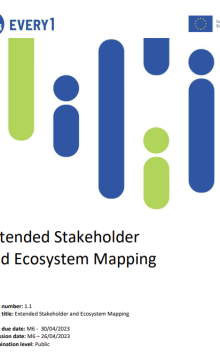
Every1 D1.1 Project's Stakeholder Mapping Report
Abstract
The report shows how the range of stakeholders can be supported in the digitalising energy system, which will inform further steps in the Every1 project. In the analysis, a distinction was made between organisations and individuals. By combining the knowledge needs and learning preferences identified in this research, learning material can be developed in the next steps of the Every1 project.
Introduction
In the transition towards a more sustainable electrical energy system, growing attention is on the digitalisation of the electrical energy system (International Energy Agency, 2017). Digitalising our electrical energy systems holds the promise to improve their connectedness, efficiency, reliability, and sustainability (International Energy Agency, 2017). Hence, the importance of digitalisation is endorsed by the European Commission, as digitalisation is put on the agenda by the European Commission with the 'Digitalisating the energy system - EU action plan’ adopted in October 2022. This system-wide digitalisation energy action plan aims to fosters the uptake of digitalisation in the energy system (Digitalising the Energy System - EU Action Plan, 2022).

The term ‘digitalisation’ is found to be used in a variety of ways in the context of energy systems (Heymann et al., 2023). The term is used with various focus points that emerge from the range of applications of digitalisation in energy systems. In its core, digitalisation of energy entails the increased uptake of information and communication technologies (ICT) in energy systems.